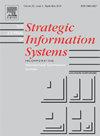Sustaining IT outsourcing performance during a systemic crisis: A configurational approach
IF 11.8
2区 管理学
Q1 COMPUTER SCIENCE, INFORMATION SYSTEMS
引用次数: 0
Abstract
The COVID-19 pandemic set off a systemic crisis that spread rapidly across the globe in early 2020, significantly affecting the outsourcing industry. Information Technology (IT) vendors as well as client firms found it challenging to maintain their performance levels. The Information Systems (IS) outsourcing literature, notably, had little insight to offer to client firms about effective IT outsourcing strategies for a systemic crisis. However, the literature did discuss two distinct yet interconnected logics for understanding IT outsourcing performance in non-crisis contexts. Whereas one logic revolves around the possession of strong internal capabilities, the other centers on the externalization of services. Building on this work, we develop a conceptual model to guide a configurational analysis centering on the sustenance of IT outsourcing performance during a systemic crisis. Based on the findings emerging from a fuzzy-set qualitative comparative analysis (fsQCA) of 200 companies across 13 countries, we theorize six organizational logics that client firms can consider to sustain IT outsourcing performance. These logics entail different combinations or configurations of client-firms’ IT outsourcing characteristics and the characteristics of the crisis faced. As systemic crises can engender more or less intense uncertainty, thus affecting the strategic options available to decisions makers, we also use our findings to theorize organizational logics that can enable performance sustenance during low, medium, and high severity crises. We discuss our research’s contributions to the IS outsourcing literature as well as its practical implications.
在系统性危机期间维持 IT 外包绩效:配置方法
2020 年初,COVID-19 大流行引发了一场迅速蔓延全球的系统性危机,对外包行业造成了重大影响。信息技术(IT)供应商和客户公司都发现,保持业绩水平是一项挑战。值得注意的是,信息系统(IS)外包文献对客户公司应对系统性危机的有效 IT 外包战略几乎没有什么见解。不过,这些文献确实讨论了在非危机背景下理解信息技术外包绩效的两种截然不同但又相互关联的逻辑。一种逻辑围绕着拥有强大的内部能力,另一种逻辑则以服务外部化为中心。在此基础上,我们建立了一个概念模型,用于指导以系统危机期间 IT 外包绩效的维持为中心的配置分析。根据对 13 个国家 200 家公司进行的模糊集定性比较分析(fsQCA)得出的结论,我们从理论上提出了客户公司为维持 IT 外包绩效可以考虑的六种组织逻辑。这些逻辑需要客户企业的 IT 外包特征和所面临危机的特征的不同组合或配置。由于系统性危机会带来或多或少的不确定性,从而影响决策者的战略选择,因此我们还利用我们的研究结果,从理论上提出了在低、中、高严重性危机期间能够维持绩效的组织逻辑。我们将讨论我们的研究对信息系统外包文献的贡献及其实际意义。
本文章由计算机程序翻译,如有差异,请以英文原文为准。
求助全文
约1分钟内获得全文
求助全文
来源期刊

Journal of Strategic Information Systems
工程技术-计算机:信息系统
CiteScore
17.40
自引率
4.30%
发文量
19
审稿时长
>12 weeks
期刊介绍:
The Journal of Strategic Information Systems focuses on the strategic management, business and organizational issues associated with the introduction and utilization of information systems, and considers these issues in a global context. The emphasis is on the incorporation of IT into organizations'' strategic thinking, strategy alignment, organizational arrangements and management of change issues.
 求助内容:
求助内容: 应助结果提醒方式:
应助结果提醒方式:


